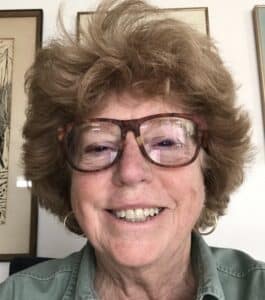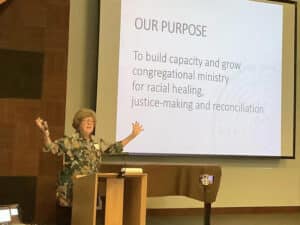Meet Susan Woods: Leveraging Racial Healing Circles to Deepen Connections

Susan Woods
Susan Woods believes that building relationships is essential for racial healing. “Racial healing circles create a moment of authentic personal exchange and truth sharing,” said Susan, who spent her career specializing in training and facilitation focused on developing relationships in the workplace. “It is a powerful experience.”
Through the Greater Buffalo Racial Equity Roundtable, the Racial Healing Circle strategy, adopted from the W.K. Kellogg Foundation as a tool for racial healing, was introduced to the Western New York community via inter-congregational strategy in 2018. The WNY and NWPA Episcopal Dioceses Commission to Dismantle Racism and Discrimination, of which Susan is a member, was invited to the table by Hon. Rose H. Sconiers, Chair of the Roundtable. From there, Susan began her learning journey of the impact of racial healing circles.
The Commission hosted a racial healing circle for their members as a way to bring the group together. Susan appreciated how the circle process provided a unique storytelling technique. Susan trained to become a facilitator under the direction of Mee Moua, a former Minnesota Senator who is currently president and executive director of Asian Americans Advancing Justice, an organization that promotes human and civil rights for Asian Americans and social equity for all.
“The work of dismantling racism needs to focus on more than policy change,” Susan noted. “Programs need to be rooted in relationships and building understanding across differences. Racial healing circles are a way to do that.”

Over the years, Susan has participated in and facilitated various types of group conversations, both in-person and online. She recounted a time when she facilitated a group at a manufacturing company, where an older white man and a younger Black woman discovered they were both military veterans. Discovering that shared experience gave them both a newfound respect for one another. Racial healing circles are powerful i
n the same way. “Participants seem to really enjoy the process of going through a racial healing circle. The experience touches them in a deep and memorable way,” Susan said.
Today, racial healing circles remain an important piece of the Roundtable’s work to expand and deepen personal connections across racial groups, and the Roundtable continues to expand its capacity for racial healing in our community by providing in-depth training to dozens of local racial healing practitioners.
According to Susan, racial healing circles are a way for people to discover shared humanity and gain the courage to step outside their comfort zones. “Healing is a shared experience,” she said. “Racial healing circles open minds and hearts. They are about learning from one another and creating a new way of moving forward through shared humanity.”